Whether it’s guiding you through the insurance process or teaching kids how to take Sogroya®, NovoCare® is here to help.
NovoCare® is here for you every step of the way
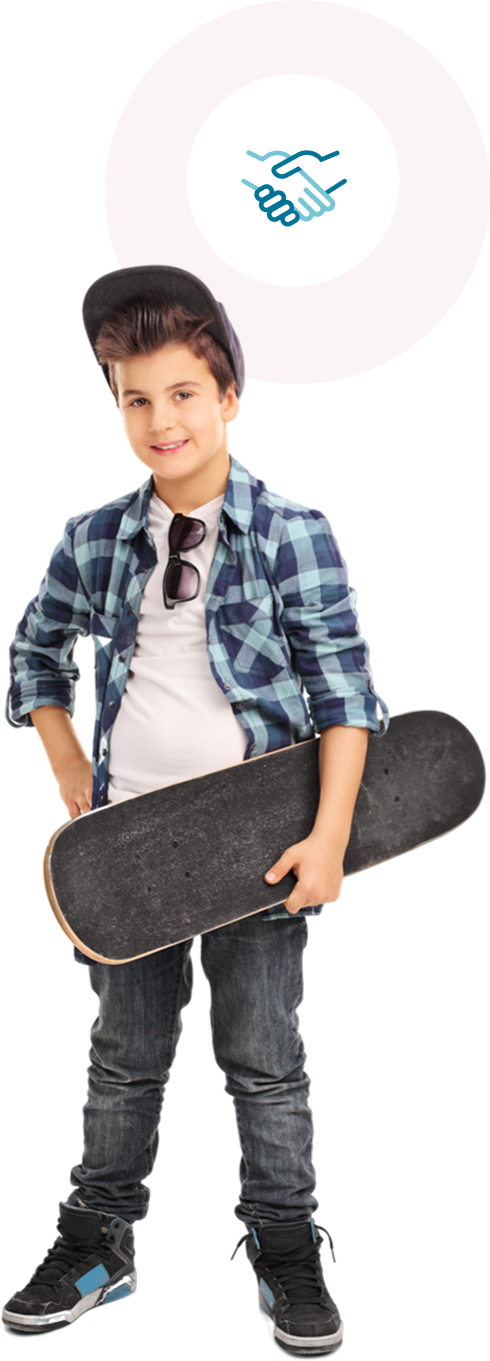
Actor portrayal
NovoCare® is here for you every step of the way
Whether it’s guiding you through the insurance process or teaching kids how to take Sogroya®, NovoCare® is here to help.
Verify your coverage
Great news: Novocare® can now verify individual benefit coverage. Visit the NovoCare® website or call 1-888-NOVO-444 (1-888-668-6444) to get started.
NovoCare® is here for you every step of the way
Whether it’s guiding you through the insurance process or teaching kids how to take Sogroya®, NovoCare® is here to help.
Verify your coverage
Great news: Novocare® can now verify individual benefit coverage. Visit the NovoCare® website or call 1-888-NOVO-444 (1-888-668-6444) to get started.
Guidance and support
With NovoCare®, you get a dedicated Case Manager to help you through approval and other steps in getting covered by insurance.
Here’s an example of how the process might look:

After you and your doctor choose Sogroya®, your doctor’s staff submits your information to NovoCare®.

NovoCare® checks with your insurance company to make sure you’re eligible for coverage and passes the information on to your doctor’s office—the same day if possible.

Your Case Manager will call you to explain how we support you and answer your questions.

NovoCare® will also send you a Starter Kit in the mail.

Finally, you’ll receive your first pen and start therapy.
Guidance and support
With NovoCare®, you get a dedicated Case Manager to help you through approval and other steps in getting covered by insurance.
Here’s an example of how the process might look:

After you and your doctor choose Sogroya®, your doctor’s staff submits your information to NovoCare®.

NovoCare® checks with your insurance company to make sure you’re eligible for coverage and passes the information on to your doctor’s office—the same day if possible.

Your Case Manager will call you to explain how we support you and answer your questions.

NovoCare® will also send you a Starter Kit in the mail.

Finally, you’ll receive your first pen and start therapy.
Major insurance companies cover Sogroya®
The first once-weekly growth hormone (GH) treatment for children and adults with GHD, Sogroya® has preferred coverage with CVS Caremark®, TRICARE®, Florida Medicaid, MedImpact/Elixir, Anthem Blue Cross Blue Shield, and Aetna®.a
aIndividual benefit designs and individual coverage may vary. Because many health plans offer more than one formulary, check directly with your health plan to confirm coverage.




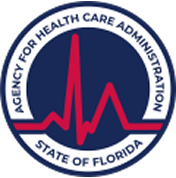

Navigating the GH treatment journey
Through NovoCare®, you can get the support you need every step of the way. This includes the following.
Sogroya® savings card offer
JumpStart™ program to avoid delay in starting therapy
In-person or virtual device training
Patient Assistance Program (PAP) for eligible patients

Visit the NovoCare® website for guidance through approval and other steps in getting covered by insurance.
Call 1-888-NOVO-444 (1-888-668-6444)
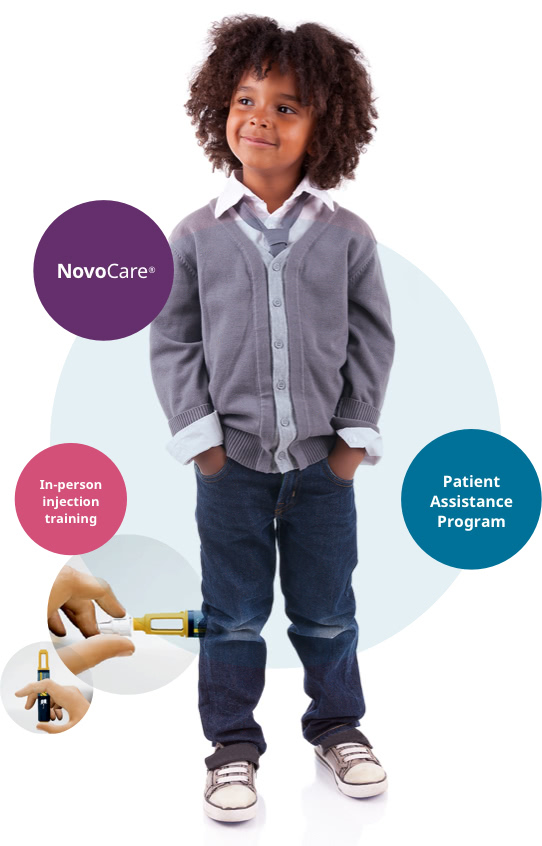
Actor portrayal
Keeping treatment affordable and accessible
Your NovoCare® Case Manager can also help you access helpful resources like the Sogroya® Savings Offer (which offers eligible commercially-insured patients co-pay savings of up to $5,000 a year), the Patient Assistance Program (which can help eligible patients receive Sogroya® free of charge), and more.
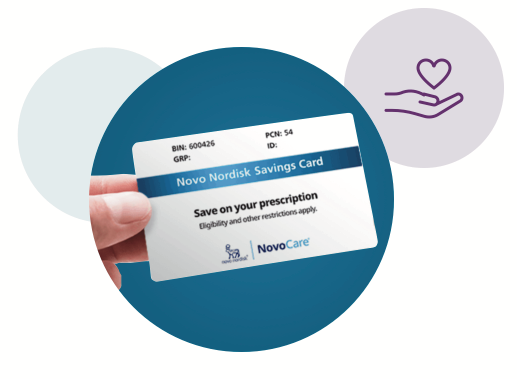

Meet your pen pal!
The Sogroya® Starter Kit, from NovoCare®, comes with a stuffed animal buddy pen pal and will help you and your child become comfortable with taking GH treatments safely, correctly, and consistently.
The Starter Kit includes:
- Your stuffed animal buddy to help demonstrate how and where to take injections.
- Your stuffed animal buddy companion book.
- Sharps container for needle disposal.
- Alcohol wipes to prepare skin for injection.
- Starter Kit cinch bag to keep injection materials together.
- Much more, including instruction booklets for Sogroya® pens and information about how once-weekly Sogroya® works.
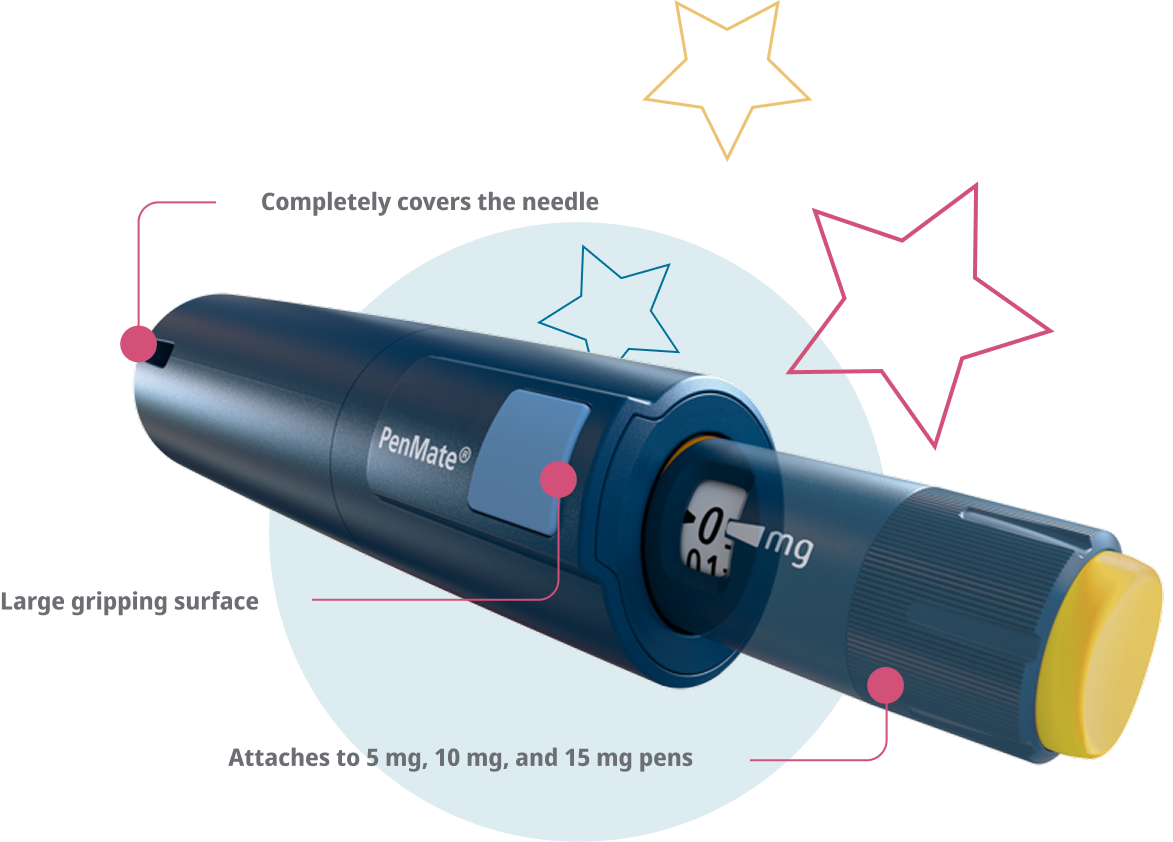
Not a fan of needles? PenMate® keeps needles out of sight
Now approved for Sogroya®, PenMate® is a reusable cover for the Sogroya® 5 mg, 10 mg, and 15 mg pens. Once attached to the end of a pen, it completely covers the needle, keeping it unseen as it enters the skin.
You can order your PenMate® by contacting your NovoCare® Case Manager or by calling 1-888-668-6444.
Frequently asked questions about barriers to treatment
You may have a few questions about using once-weekly Sogroya®. We’ve got the answers you’re looking for.
Your NovoCare® Case Manager will work with you through a multi-step appeals process. You may need to provide additional information, so be sure to send it along promptly if asked.
If your insurance coverage or financial circumstances change, call NovoCare®. We'll support you with the services you're eligible for.
Most insurance companies require prescriptions for medications such as Sogroya® to be reauthorized every so often—every 6 or 12 months, for example. NovoCare® will work with you and your doctors office throughout the reauthorization process.
GHD community support
Find out more about organizations supporting the growth community.
Have questions about Sogroya®?
Visit our FAQ page to find the answers you need
